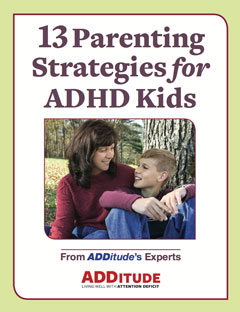"I can't do this! It's too hard!" How many times have you heard your child say this, even before he attempts the task? With my son and daughter, who have ADHD, it leads to the circular and fruitless argument: "Yes, you can!" "No, I can't!"
As if this weren't frustrating enough, each of my children has said, "I'm just dumb, Mom." It is hard to hear your kindergartner judge himself so harshly. How can they be convinced, already, that they are dumb?
Called Out a Lot
Children with ADHD are redirected and corrected more than their peers. Because of their immaturity, impulsivity, hyperactivity, and/or inattention, kids with attention deficit elicit a lot of adult attention, whether they want it or not. Your very young child, at some point, will realize that she is monitored and reprimanded more than her non-ADHD peers. At first it is only adults who admonish her, but, inevitably, peers will do the same. Over time, this pattern will affect her self-esteem.
Children five to seven years old are developing their personalities and sense of self. It is hard to see a child suffer hits to his self-esteem. My neurotypical (non-ADHD) daughter approached me after she had, once again, defended her ADHD brother and sister to other children. "I'm sick and tired of having to defend them," she complained. "They are really smart! They just don't have the kind of smart that shows up well."
My daughter was correct. Some strengths and abilities don't get enough affirmative recognition. Children with ADHD need more positive input than their peers, but they get less, particularly if they have "the kind of smart that doesn't show up well." A child may be musically gifted or have a talent for art or putting models together, but if a child's strength is not in academics or sports, he won't get the positive feedback he needs to bolster his self-esteem. Here's how you can counteract all the negative feedback:
Praise That Works
Our children need to hear positive remarks from us. General remarks, such as "Good job," are inadequate. Vague compliments are not powerful enough for a child whose self-esteem is tottering. Instead, make specific comments that praise exactly what the child is doing right. Don't limit your positive feedback to tasks that are completed perfectly. Your child with ADHD has to work harder than most, so praise the effort. Use descriptive comments like "You kept trying even though it was hard. Way to go!"
Catch the child doing what you want her to, and reinforce it. Saying, "I like how you remembered to put your shoes on the mat" is better than "Good girl!" Tell your child what she did right. Your words help her see that she did well, and that you noticed.
Next: Explain Away the Negatives




